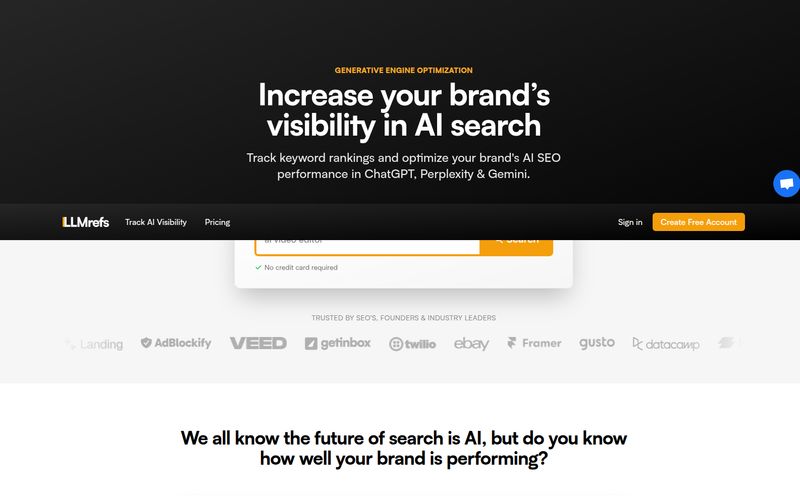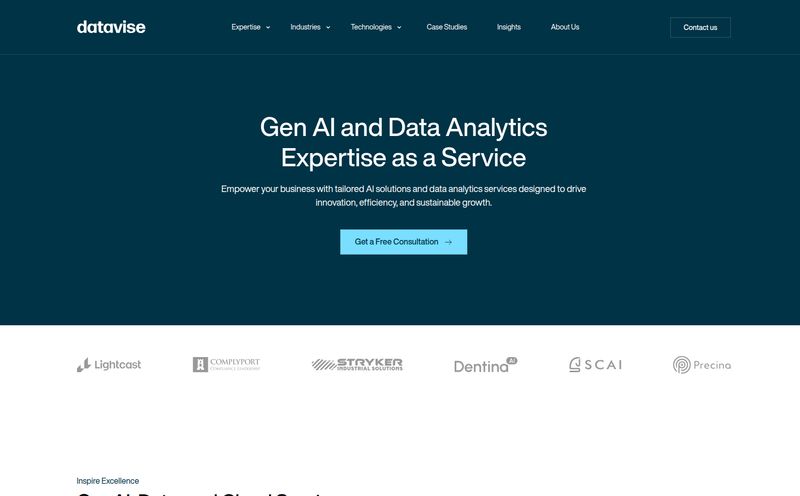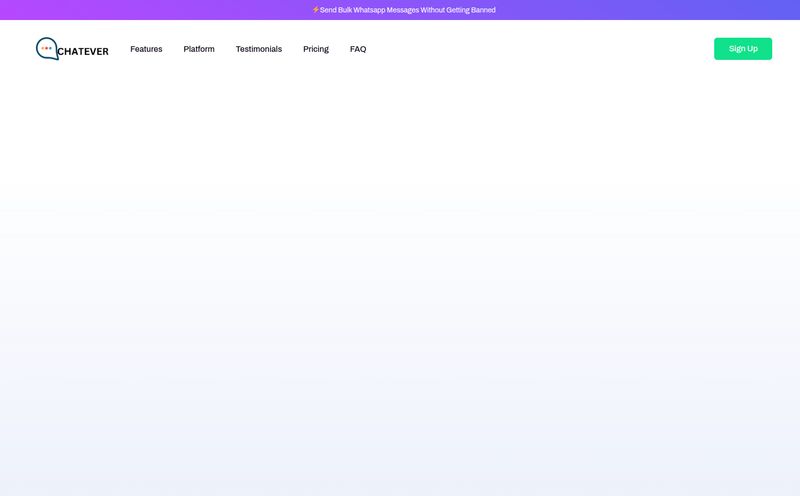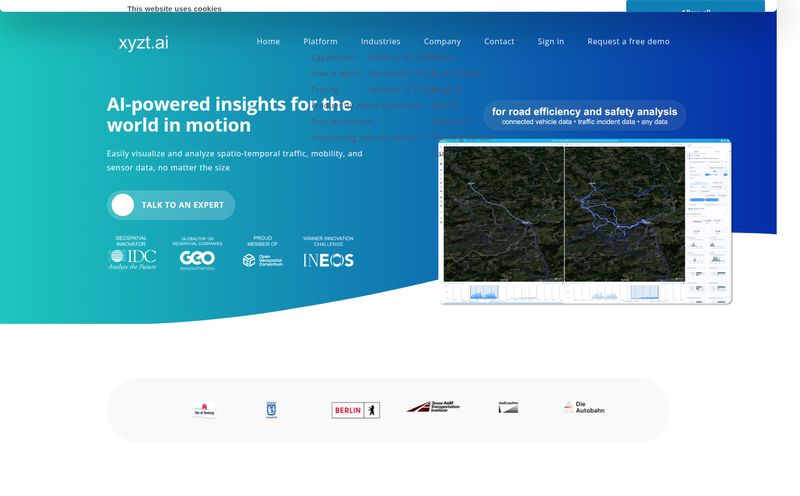Just you and me, fellow marketer to marketer. How’s your ROAS doing? No, I mean, really doing? If you're anything like me, you've spent more than a few sleepless nights staring at your Meta Ads dashboard, then at your Google Analytics, then at your Shopify sales, trying to connect the dots. It’s like trying to solve a crime with half the clues missing. Ever since the great iOS 14 apocalypse and the slow death of the third-party cookie, attribution has become a murky, frustrating mess.
We’re basically throwing money at the wall and hoping some of it sticks near the right-colored chart. Is that organic search? Was it that last-ditch retargeting ad? Or the influencer post from two weeks ago? Who knows! The data is a mess.
So when a tool like BooleanMaths pops up on my radar, claiming it can help “debug your revenue,” my ears perk up. It’s a bold claim. I've seen dozens of platforms promise to be the silver bullet for marketing attribution. Most are either too complicated, too expensive, or just another pretty dashboard that doesn't actually solve the core problem. But I decided to take a proper look, and honestly, I’m intrigued.
What's the Big Deal with Attribution, Anyway?
Okay, so we all know what attribution is—giving credit where credit is due. But in today’s world, the customer journey isn't a straight line. It’s a tangled web. A user might see an ad on Instagram, forget about it, get a reminder on Facebook a week later, Google your brand name, click an organic link, and then finally buy after getting a cart abandonment email from Klaviyo. So who gets the credit? Standard pixel-based tracking often just gives it all to the last click, completely ignoring the complex dance that led to the sale. This is a huge problem.
It means you might be cutting the budget for a top-of-funnel campaign that’s actually working wonders, simply because it doesn’t get that “last click” glory. This is where getting it right can literally make or break your brand. It’s not just about reporting; it's about making smart budget decisions.
Enter BooleanMaths: More Than Just Another Analytics Dashboard
So, what makes BooleanMaths different? From what I can tell, it’s built from the ground up for the specific headaches of modern D2C brands. It's not trying to be a one-size-fits-all solution for B2B SaaS and everyone else. It’s focused. And I like focus.
Their approach seems to hinge on two very powerful concepts: deep user journey mapping and a reliable data pipeline through Conversion APIs.
Mapping the Entire Customer Journey (For Real This Time)
Instead of just looking at isolated clicks, BooleanMaths aims to map the complete user story, from that very first ad they saw to the final purchase. It does this by using a mix of methods, including fingerprinting, which helps identify a user across different sessions and devices even when cookies fail. It’s like having a private investigator for your web traffic, meticulously piecing together every touchpoint to give you a clear picture of what’s actually influencing your customers. This means you finally get to see the true value of that initial TikTok video or that witty tweet.
The Magic of Conversion APIs (CAPI)
This, for me, is the main event. If you’re running ads on Meta (Facebook & Instagram), you know how shaky browser-side pixel data has become. Ad blockers, privacy settings, and Apple’s App Tracking Transparency (ATT) framework can prevent the pixel from firing correctly. The Conversion API, or CAPI, is the answer. It creates a direct, server-to-server connection between your website (or Shopify store) and the ad platform. It's a secure data hotline that can't be blocked by a browser.
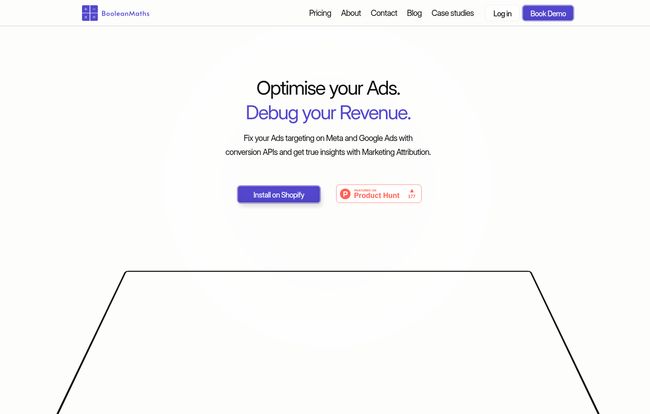
Visit BooleanMaths
The beauty of BooleanMaths is that it offers no-code CAPI integrations. You don't need to be a developer to set this up. You connect your Shopify, link up Meta and Google Ads, and let the platform handle the heavy lifting of sending high-quality conversion data back to your ad campaigns. Better data means better optimization from the ad algorithms, which means a better return on ad spend (ROAS). It's a beautiful, logical cycle.
A Look at How It All Works
The platform seems to be built on a foundation of providing accurate marketing attribution, not just fuzzy estimates. This is powered by its ability to collect first-party data and stitch it together into a coherent narrative. You get real-time insights, so you're not making decisions based on last week's news. And it all plugs into the tools you're already using. I saw integrations for Shopify, Meta, Google Ads, Klaviyo, and Mailchimp, which covers the stack for a huge number of D2C brands. It's a practical, no-nonsense approach.
So, How Much Does This Cost? A Breakdown of BooleanMaths Pricing
Alright, let's talk turkey. Pricing is always the elephant in the room. I was pleasantly surprised here. There’s a genuinely useful Free Tier. It gives you 1,000 unique visitors a month and 30 days of data retention. It’s perfect for getting your feet wet or for a brand that's just starting out. No harm in trying it out.
| Plan | Monthly Price | Who It's For |
|---|---|---|
| Free | $0 | New startups or for testing the platform. |
| Startup | $25 | Small businesses getting serious about ad optimization. |
| Pro | $75 | Growing teams that need more data and longer retention. |
| Business | $200 | Established brands with significant ad spend and traffic. |
The paid plans scale pretty reasonably, starting at just $25/month for the Startup plan, which bumps you up to 7,500 visitors and 90 days of data. The Pro and Business tiers offer more visitors and longer data retention periods for larger operations. And they offer a 20% discount if you pay yearly, which is always nice. In my book, if this tool can help me save even one or two percent of my ad spend from being wasted, it pays for itself almost instantly.
Is BooleanMaths Right for Your D2C Brand?
Look, no tool is a magic wand. But some tools are a hell of a lot better than fumbling around in the dark. If you’re a D2C brand running ads on platforms like Meta or Google, and especially if your store is on Shopify, BooleanMaths seems like a no-brainer to at least try. The pain it solves—the attribution black hole—is one of the biggest challenges in ecommerce marketing right now.
Yes, there's some initial setup. You'll need to install their pixel and configure the API connections. But any powerful tool requires a little bit of work to get going. This isn't a flaw, it's just the price of admission for getting good, clean data. If you’re tired of guessing and ready to make data-driven decisions that actually impact your bottom line, this seems like a solid contender for your marketing stack.
Frequently Asked Questions about BooleanMaths
1. What exactly is BooleanMaths?
It's a marketing analytics and attribution platform designed specifically for direct-to-consumer (D2C) brands. It helps you accurately track where your sales are coming from, especially from paid ad campaigns, by mapping the full user journey and using a reliable Conversion API.
2. How is this different from Google Analytics 4?
While GA4 is a powerful, broad analytics tool, BooleanMaths is more specialized. It focuses intensely on marketing attribution and ad optimization for ecommerce. Its strengths are in its server-side tracking (CAPI) for platforms like Meta and its clearer, more focused user-journey mapping for D2C brands, which can sometimes be clearer than GA4's data-driven model for specific ad-related questions.
3. Is it difficult to set up?
It's designed to be a no-code solution. While there is some initial setup, like installing a tracking script on your site and connecting your ad accounts, it doesn’t require you to be a developer. It's a standard process for any marketing integration, and they seem to have streamlined it.
4. What platforms does BooleanMaths integrate with?
It integrates with the core D2C marketing stack, including Shopify, Meta (Facebook & Instagram) Ads, Google Ads, Klaviyo, and Mailchimp. This allows it to both pull data from your store and send conversion data back to your campaigns.
5. Can I try it before I buy it?
Yes, absolutely. They have a Free Tier that lets you track up to 1,000 unique visitors per month. It's a great way to test the platform's features and see if it's a good fit for your brand without any commitment.
My Final Thoughts
In the chaotic world of post-cookie marketing, clarity is the new currency. We need tools that don’t just show us data, but tell us a story. A true story. From my initial analysis, BooleanMaths appears to be a very strong step in that direction. It’s focused, fairly priced, and tackles the exact problems that keep D2C marketers like us up at night. If you’re ready to stop guessing and start debugging your revenue, it’s definitly worth a look.
